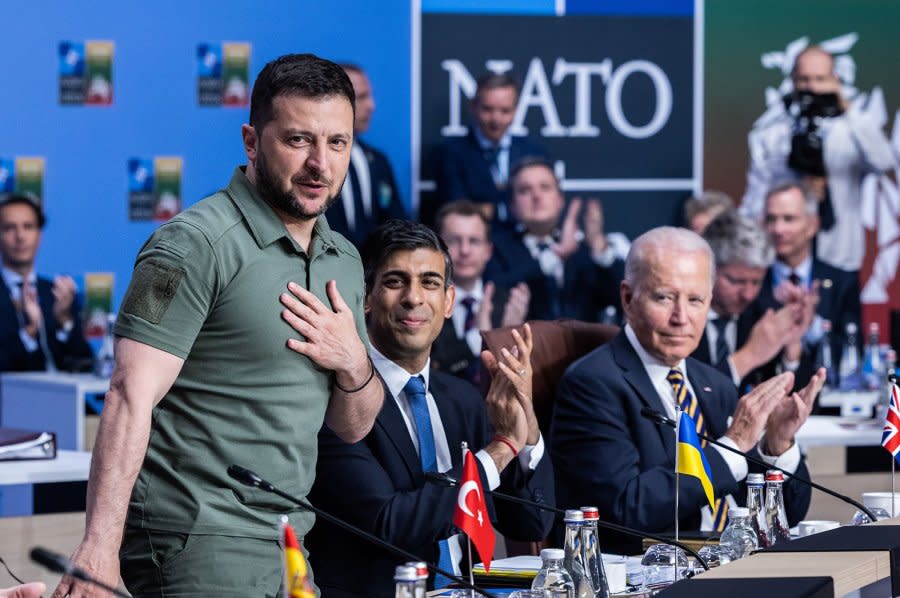It's time to find a way to end war in Ukraine

- Oops!Something went wrong.Please try again later.
Two of the most unanswerable questions about the war in Ukraine are when and how it will end.
Those who hoped that Ukraine would seize the offensive and force Russia to return all or some of the territories that were illegally occupied are likely to be disappointed.
Others who predicted that Vladimir Putin would be so weakened by the protest march on Moscow staged by Yevgeny Prigozhin that a new leadership might emerge are still waiting.
Meanwhile, critics of the Biden administration who argued that despite $80 billion set aside for Ukraine, the White House held back on the pace and quality of the military support it provided that retarded the effectiveness of Kyiv's offensive. F-16 jets and ATACMS 190-mile range missiles are among those systems that Ukraine desperately needs. And bipartisan agreement on aid for Ukraine appears to be in decline, certainly in parts of the Republican Party.
Other factors are at play.
President Joe Biden may promise that America will continue to help Ukraine "for as long as it takes." But this is not going to be a repeat of 20 years in Afghanistan or Iraq and even 13 years in Vietnam. And the United States is running out of weapons to send without making serious reductions in our stocks.
The obvious step the administration should take is to convene an Iraq-like study group similar to the George W. Bush initiative in 2006. Of course, Bush had been re-elected and could not run again, so presidential politics were not a consideration. They would be today.
The study was co-chaired by former Secretary of State James Baker and Rep. Lee Hamilton, D-Ind. The problem was that it still took another 15 years before the United States and the coalition finally withdrew from Afghanistan. That cannot be repeated in Ukraine.
The study should be focused on providing a range of outcomes that might be achieved in the Ukraine war; conducting a cost-benefit analysis on each; and specifying the consequences of each. The possible outcomes should include a ceasefire freezing the borders; defining what a Ukrainian victory would mean and how to achieve it; and what a Russian victory would mean and how that would be achieved.
Part of this study group must determine how Ukraine can be rebuilt; who pays for that; how future aggression on both sides can be prevented and guaranteed, among other issues. And, in any case, beginning discussions between the United States/NATO with Ukraine and Russia on ending the war -- or using intermediaries -- should be raised.
This is hugely controversial. Finding nonpartisan or bipartisan members for this panel may prove difficult. As to the sensitivity of the effort, the study group must operate under strict rules of confidentiality and remain classified until it is completed.
Yet, unless or until the United States and its allies can define the possible outcomes to be achieved, the current open-ended commitment is unlikely to be sustained. Obviously, neither Russia nor Ukraine can agree on acceptable outcomes. Ukraine wants Russia ejected from all its territories and guarantees that Moscow will not re-attack.
Russia minimally demands retaining the territories it holds and has declared to be part of Russia. And Moscow's appetite may be more expansive. Putin also may be betting that if he can persist through the November 2024 elections, Donald Trump could win. Or a re-elected Biden might be more conducive to negotiations.
A reason for starting this commission now is that its findings could be completed in late 2024. A further reason is that the war could escalate. Putin has threatened use of nuclear weapons. Many doubt they would be used. But damaging nuclear power plants and dams is possible. Russia has ended the grain deal to export vital food stuffs from the Black Sea, as well as threatening to blockade that sea. Escalation must not be allowed to happen.
In all prior wars since 1941, at least one presidential election occurred. In 1952, Dwight Eisenhower won in part by promising to end the Korean War. He reportedly threatened China with using nuclear weapons. Trump has bragged that he will end the war in 24 hours. That is poppycock.
Biden, however, has not answered these questions of when and how the war will end. The nation must address those two questions, no matter how difficult. The time for that to begin is now. Waiting will extend the war. That means more death, destruction and possible escalation.
It is time for that war to end.
Harlan Ullman is senior adviser at Washington's Atlantic Council, the prime author of "shock and awe" and author of "The Fifth Horseman and the New MAD: How Massive Attacks of Disruption Became the Looming Existential Danger to a Divided Nation and the World at Large." Follow him @harlankullman. The views and opinions expressed in this commentary are solely those of the author.

